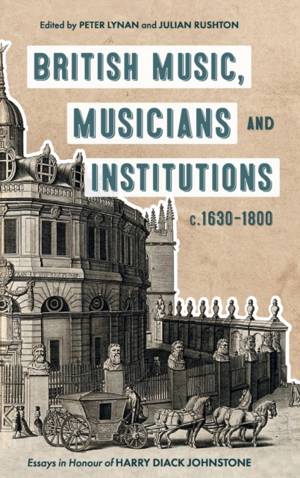
- Retrait gratuit dans votre magasin Club
- 7.000.000 titres dans notre catalogue
- Payer en toute sécurité
- Toujours un magasin près de chez vous
- Retrait gratuit dans votre magasin Club
- 7.000.0000 titres dans notre catalogue
- Payer en toute sécurité
- Toujours un magasin près de chez vous
British Music, Musicians and Institutions, C. 1630-1800
Essays in Honour of Harry Diack Johnstone
Peter Lynan, Julian Rushton
209,45 €
+ 418 points
Description
Building upon the developing picture of the importance of British music, musicians and institutions during the eighteenth century, this book investigates the themes of composition, performance (amateur and professional) and music-printing, within the wider context of social, religious and secular institutions. British music in the era from the death of Henry Purcell to the so-called 'Musical Renaissance' of the late nineteenth century was once considered barren. This view has been overturned in recent years through a better-informed historical perspective, able to recognise that all kinds of British musical institutions continued to flourish, and not only in London. The publication, performance and recording of music by seventeenth- and eighteenth-century British composers, supplemented by critical source-studies and scholarly editions, shows forms of music that developed in parallel with those of Britain's near neighbours. Indigenous musicians mingled with migrant musicians from elsewhere, yet there remained strands of British musical culture that had no continental equivalent. Music, vocal and instrumental, sacred and secular, flourished continuously throughout the Stuart and Hanoverian monarchies. Composers such as Eccles, Boyce, Greene, Croft, Arne and Hayes were not wholly overshadowed by European imports such as Handel and J. C. Bach. The present volume builds on this developing picture of the importance of British music, musicians and institutions during the period. Leading musicologists investigate themes such as composition, performance (amateur and professional), and music-printing, within the wider context of social, religious and secular institutions.
Spécifications
Parties prenantes
- Auteur(s) :
- Editeur:
Contenu
- Nombre de pages :
- 316
- Langue:
- Anglais
- Collection :
- Tome:
- n° 28
Caractéristiques
- EAN:
- 9781783276479
- Date de parution :
- 05-11-21
- Format:
- Livre relié
- Format numérique:
- Genaaid
- Dimensions :
- 156 mm x 234 mm
- Poids :
- 621 g

Les avis
Nous publions uniquement les avis qui respectent les conditions requises. Consultez nos conditions pour les avis.






